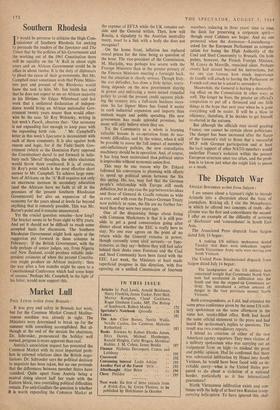Market Lull
PAUL LEWIS writes from Brussels : It was grey and sultry in Brussels last week, but for the Common Market Council Mediter- ranean sunshine was already in sight. The Ministers were determined to break up for the summer with something accomplished. But al- though at the end of the session the chairman, Dr. Schroeder, pronounced the holiday well earned, progress is more apparent than real.
Austria's association request has presented the Common Market with its most important prob- lem in external relations since the British nego- tiations. Dr. Schroeder says the political decision to negotiate has been taken, but no one pretends that the differences between member States have vanished. Quite apart from Austria being a neutral doing almost half her trade with the Eastern block, two overriding political difficulties remain. For anti-Gaullists the question is whether it is worth expanding the Common Market at the expense of EFTA while the UK remains out- side and the General within. Then, how will Russia, a signatory to the Austrian neutrality treaty, react to a link with a body she does not recognise?
On the home front, inflation has replaced cereal prices for the time being as question of the hour. The vice-president of the Commission, M. Marjolin, was perhaps less severe with the Foreign Ministers than in the greater privacy of the Finance Ministers meeting a fortnight back, but the situation is clearly serious. Though Italy, the star defaulter, has done a little better, every- thing depends on the new government staying in power and enforcing a more mixed remedial policy to avoid the present credit squeeze pitch- ing the country into a full-scale business reces- sion. So far Signor Moro has found it easier to curb industrial expansion and imports than restrain wages and public spending. His new government has made splendid promises, but many will only believe when they see.
Yet the Community as a whole is learning valuable lessons in co-operation from its eco- nomic difficulties, and by the winter, when it will be possible to assess the full impact of members' anti-inflationary policies, the new consultative machinery should be in operation. And, of course, it has long been maintained that political union is impossible without economic union first.
This may be one reason why Dr. Erhard followed his conversion to planning with efforts to speed up political union between the Six this spring. He, too, may feel that the German people's relationship with Europe still needs definition, but in any case the gap between his ideas and those of General de Gaulle remains as wide as ever, and with even the Franco-German Treaty now publicly in ruins, the Six are no further for- ward than they were two years ago.
One of the disquieting things about living with Common Marketeers is that it is still pos- sible to get a good conversation going after dinner about whether the EEC is really here to stay. No one ever agrees on the point of no return while .the General remains in power, though currently some civil servants—or func- tionaries, as they say--believe they will feel safer behind their desks once Euratom and the Coal and Steel Community have been fused with the EEC. Last week, the Ministers at least made superficial progress in this direction, with five agreeing on a unified Commission of fourteen members reducing in three years' time to nine, the limit for preserving a corporate spirit— though most Cabinets are larger. And no one protested when the dormouse—Luxembourg- asked for the European Parliament as compen- sation for losing the High Authority of the Coal and Steel Community to Brussels. On both points, however, the French Foreign Minister, M. Couve de Murville, remained silent. Perhaps events had moved beyond his instructions, but no one can foresee how much importance de Gaulle will attach to having the Parliament on French soil once he is asked to surrender it.
Meanwhile, the General is having a demoralis- ing effect on the Commission in other ways as well. The longer he lives, the greater an official's temptation to put off a thousand and one little things in the hope that next year when he is gone everything will be easier. It will be a blow to efficiency, therefore, if he decides to get himself re-elected in the autumn.
But although the officials may avoid goading France, one cannot be certain about politicians. The danger has been increased after the fiasco of the General's visit to Bonn that a successful MLF with German participation and at least the tacit support of other NATO members would underline France's isolation within the present European structure once too often, and the prob- lem is to know just what she might kick to pieces as a result.






























 Previous page
Previous page